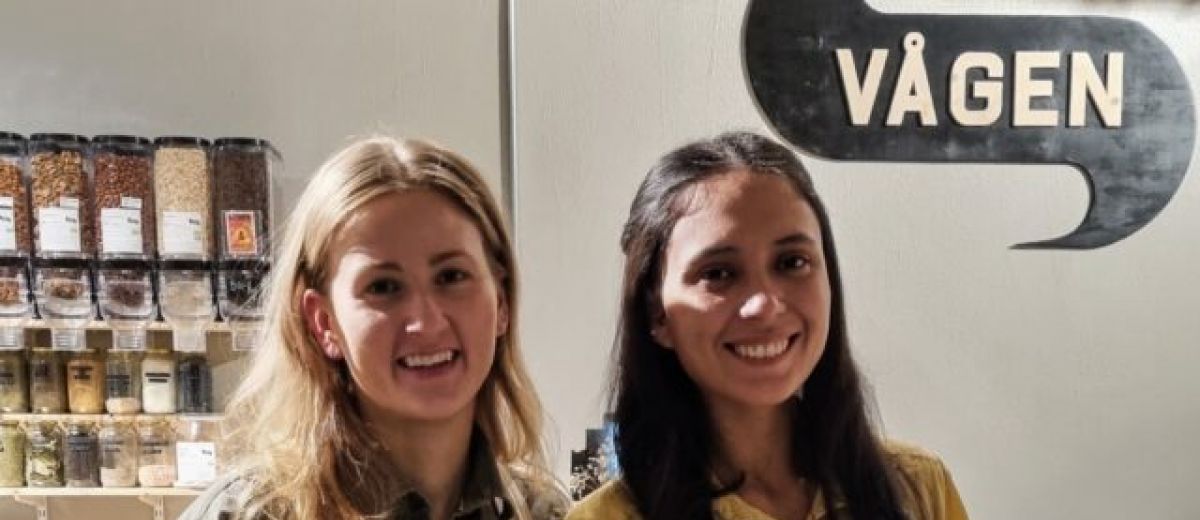
A zero-waste shop joining the Peak Innovation Incubator Programme
Based on an equal interest in zero waste as a lifestyle, Fanny Näslund and Estefanía Coral founded Vågen in 2020. The goal was to create a place where people could connect, learn and meet as a community. In October 2021, they joined the Peak Innovation Incubator programme with the aim to bring zero waste and sustainable grocery shopping to as many people as possible. To do this, they need to develop systems and tools that help scale the concept in a sustainable way. The plan is to open at least five more shops during the next year, as well as a zero waste online shop, where people will be able to buy both food and zero-waste products.
— At first, we saw the need for a place where people like ourselves could buy organic groceries, without the packaging. Now, we have identified a new need: to help make it easier to lead a sustainable lifestyle, and to make it accessible to as many people as we can. We want to make it easier for anyone to adopt a lifestyle that puts less pressure on the environment, our fellow humans, and our own minds.
What is Vågen’s plan for expansion?
— In October 2021, we joined the Peak Innovation Incubator programme. Our aim is to bring zero-waste and sustainable grocery shopping to as many people as we can. To do this, we need to develop systems and tools that help us scale our concept in a sustainable way. We started the process by creating a franchise model and we opened the first store in Järfälla, Stockholm. We will open another store in Umeå during the spring of 2022. The plan is to open at least five more shops during the coming year. We are also building our zero-waste online shop, where people will be able to buy both food and zero-waste products. We will launch it during the coming months.
Why is expansion important to you?
— There is great demand for sustainable shopping and zero waste. Since receiving Änglamarkspriset 2020, we have received numerous requests from people who want to open their own zero-waste shops but who need help and guidance during the process. We can also see that there is a need to create more solutions in order to achieve the Agenda 2030 Sustainable Development Goals and move our society towards a more circular model.
What opportunities and obstacles do you see through the expansion?
— There are many opportunities, such as being leaders of the concept, but also to be role models and bring people and companies together to achieve a zero-waste world. However, there are also many challenges, such as changing people’s consumption-focused behaviour.
How do you view the market for zero-waste shops in Sweden?
— Zero waste is not as common in Sweden as in many other places around the world. There is little accumulated knowledge and no coordinated way to access and share the knowledge that will drive the development of zero-waste shops. We are working on scaling and developing zero waste in Sweden and we hope to make it easier to spread the concept to make it more accessible to people.
— We can clearly see that the market for zero waste in Sweden is growing. More and more people are getting tired of all the waste they are creating and of not having an option to shop differently. We can see that people are becoming increasingly aware of the challenges of recycling. This makes them more interested in other solutions for waste. Zero waste also offers a different shopping experience. In a society filled with obligations and stressful deadlines, many people come to our shop seeking a quiet moment and something rather therapeutic, as opposed to running around the supermarket, which in many cases can cause even more stress.
How do you view the connection between Vågen and The Ocean Alliance’s vision, connected to the transition of businesses to a circular model? How can a zero waste shop help contribute to that vision?
— Zero-waste shops like Vågen can help people in many ways to live in a way that contributes to the vision. By refilling reusable containers, we can refuse single-use packaging, especially, but not limited to, plastics. This means that less material will go to landfill, or even worse, discarded in nature or into the ocean. It's a way to turn off the tap of plastic pollution. Zero waste also encourages people to rethink and reuse, which hopefully spills over into other aspects of their everyday lives, and not only in terms of how they choose to do their grocery shopping.